|
|
 |
Fiche d'espèce de Copépode |
|
|
Calanoida ( Ordre ) |
|
|
|
Arietelloidea ( Superfamille ) |
|
|
|
Arietellidae ( Famille ) |
|
|
|
Arietellus ( Genre ) |
|
|
| |
Arietellus plumifer Sars, 1905 (F,M) | |
| | | | | | | Syn.: | Arietellus setosus : Esterly, 1911 (p.335, figs.M);
Arietellus giesbrechti: Sewell, 1947 (p.233, figs.F,M) | | | | Ref.: | | | Sars, 1905 c (p.21,Descr.F); Farran, 1908 b (p.82); Lysholm & Nordgaard, 1921 (p.27); Sars, 1925 (p.332, figs.F,M); Rose, 1933 a (p.240, figs.F,M); Jespersen, 1934 (p.116); 1940 (p.64); Lysholm & al., 1945 (p.40); Sewell, 1947 (p.236); C.B. Wilson, 1950 (p.168, fig.M, Rem.); Grice, 1962 (p.226, figs.F); Vervoort, 1965 (p.152, Rem.); Owre & Foyo, 1967 (p.90, figs.F,M); Gardner & Szabo, 1982 (p.396, figs.F,M); Ohtsuka & al., 1994 (p.128, Redescr.F,M, figs.F,M); Heinrich, 1996 (p.1779, figs.F,M); Bradford-Grieve & al., 1999 (p.882, 937, figs.F,M); Vives & Shmeleva, 2007 (p.151, figs.F,M)
| 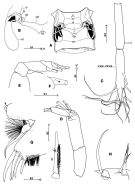 issued from : S. Ohtsuka, G.A. Boxshall & H.S.J. Roe in Bull. nat. Hist. Lond. (Zool.), 1994, 60 (2). [p.127, Fig.13]. Female (from off N Canary Is): A, genital bouble-somite (ventral); B, internal structure of right genital system; C, A1 (segmentsXXII to XXVIII); D, exopod of A2; E, Md (mandibular exopod; F, 5th segment of mandibular exopod (note reduced seta indicated by arrowhead); G, praecoxal arthrite, coxal endite and endopod of Mx1, rudimentary endopod indicated by arrowhead; H, 1st and 2nd praecoxal endites of Mx2; I, basal spine of Mx2. Genital double-somite as long as wide, almost symmetrical, with pair of gonopores ventrolaterally and anterior to single ventromedial copulary pore; paird copulatory ducts chitinized, each running anteriorly to connect with seminal receptacle near genital operculum; seminal receptacle located lateromedially, half as long as double-somite, produced posteriorly with rounded posterior tip, tapering anteriorly; receptacle duct beneath copulatory duct, opening near inner corner of genital operculum (cd = copulatory duct; cp = copulatory pore; g = gonopore; rd = receptacle duct; o, oviduct; s, spermatothore remnant; sr = seminal receptacle). A1 symmetrical, 20-segmented. A2 with 1st endopod segment without inner seta, 2nd segment with 2 short inner setae of unequal lengths and 5 terminal setae and reduced setule terminally; exopod indistinctly 7-segmented (setal formula 0, 1, 1, 1, 1, 0, 3) .Mandibular palp with 1st exopod segment having relatively reduced seta, 5th segment with normal seta and vestigial element; endopod absent. Mx1 with praecoxal arthrite with 5 naked spines, 1 short process and row of long setules; coxal endite with relatively long spinulose seta, fringed with numerous long setules along distal margin; basal seta lacking; endopod (indicated by arrowhead in Fig.13G) rudimentary, almost fused with basis, unarmed. Mx2 with 1st praecoxal endite with thick naked seta and vestigial element, 2nd praecoxal endite with 2 spinulose setae (in Fig.13,H); basal spine (Fig.13, I) with 2 rows of minute spinules along ventral margin. Scales in mm.
|
 issued from : S. Ohtsuka, G.A. Boxshall & H.S.J. Roe in Bull. nat. Hist. Lond. (Zool.), 1994, 60 (2). [p.128, Fig.14]. Female (SEM micrographs): A, genital double-somite (ventral, showing large copulatory pore, indicated by an arrow); B, right gonopore; C, copulatory pore. Nota: Mxp with 6th endopod segment (Fig.15, A-B) with elongate seta (d) with row of stout spinules whose base ornamented with lamellar projection (Fig.15,C), finely serrated, medial-length seta (c) and reduced setae (a and b). Scale bars: 0.100 mm (A); 0.030 mm (B); 0. 020 mm (C).
|
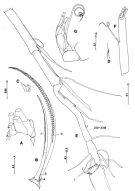 issued from : S. Ohtsuka, G.A. Boxshall & H.S.J. Roe in Bull. nat. Hist. Lond. (Zool.), 1994, 60 (2). [p.129, Fig.35]. Female: A, 4th and 5th endopod segments of Mxp (innermost vestigial seta indicated by arrowhead); B, 6th endopod segment of Mxp; C, spinule on seta \"d\" of 6th endopod segment of Mxp; D, mid-margin setae on 2nd segment of endopod of A2. Male: E, left A1 (segments XIX to XXVIII); F, 2nd endopod segment of A2; G, Md (mandibular exopod). Nota: Left A1 distinctly 19-segmented. A2 with 2nd endopod segment (Fig.15,F) with 1 short and 1 long seta medially and 5 setae and 1 vestigial setule terminally. Mandibular palp (Fig.15, G) with 1st exopod segment with well-developed seta. Scales in mm.
|
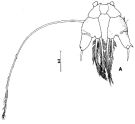 issued from : S. Ohtsuka, G.A. Boxshall & H.S.J. Roe in Bull. nat. Hist. Lond. (Zool.), 1994, 60 (2). [p.133, Fig.17]. Female: A, P5. Nota: P5 with coxae incompletely fused with intercoxal sclerite; right basal seta extremely elongate; endopod represented by knob with 2 plumose setae; exopod incompletely fused with basis, 1-segmented, with 1 terminal spine. Scale bar in mm.
|
 issued from : S. Ohtsuka, G.A. Boxshall & H.S.J. Roe in Bull. nat. Hist. Lond. (Zool.), 1994, 60 (2). [p.134, Fig.18, L]. Male: L, P5 (anterior). Scale bar in mm. Nota: P5 with coxae fused to intercoxal sclerite to form common plate, right coxa almost fused with basis, left coxa completely separate from basis. Right leg with endopod 1-segmented, spatulate; exopod indistinctly 3-segmented. Left leg with endopod indistinctly 2-segmented (unarmed); exopod indistinctly 3-segmented
|
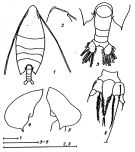 issued from : A.K. Heinrich in Zool. Zh., 1996, 75 (12). [p.1780, Fig.3]. Female (from SW Indian Ocean): 1, habitus (dorsal); 2, forehead (lateral); 3, last thoracic segment and urosome (dorsal); 4-5, orner of last thoracic segment (lateral left side); 5, idem (lateral right side); 6, P5. Scale bars in mm.
|
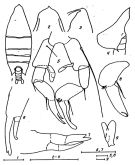 issued from : A.K. Heinrich inZool. Zh., 1996, 75 (12). [p.1777, Fig.1]. Male: 1, habitus (dorsal); 2-3, forehead (dorsal and lateral, respectively); 4, last thoracic segment (lateral left side); 5, P5; 6-7, left P5 (distal segment of exopodite); 8, right P5 (distal segment of exopodite); 9, left P5 (endopodite). Scale bars in mm: 1.0 (1-4); 0.100 (5-9).
|
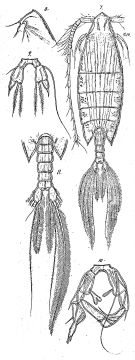 Issued from : G.O. Sars in Résult. Camp. Scient. Prince Albert I, 69, pls.1-127 (1924). [Pl.CXIX, figs.7-11]. Female: 7, habitus (dorsal); 8, forehead (lateral); 9, P5. Male: 10, P5; 11, posterior part cephalothorax and urosome (dorsal).
|
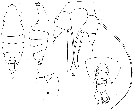 issued from : G.D. Grice in Fish. Bull. Fish and Wildl. Ser., 1962, 61. [p.227, Pl.27, Figs.6-10]. Female (from equatorial Pacific): 6-7, habitus (dorsal and lateral, respectively); 8, forehead (lateral); 9, posterior part of thorax and urosome (dorsal); 10, P5.
|
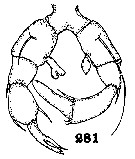 issued from : C.B. Wilson in Bull. U.S. natn. Mus., 1950, 100 (14) (4). [Pl.20, Fig. 281] Male (from tropical Pacific): 281, P5.
| | | | | Ref. compl.: | | | Sewell, 1948 (p.330, 505, 522, 528, 539); Unterüberbacher, 1964 (p.30); De Decker & Mombeck, 1964 (p.11, comme plumifera); Fleminger, 1967 a (tabl.1); Roe, 1972 (p.277, tabl.1, tabl.2); Deevey & Brooks, 1977 (p.156, tab.2, Station "S"); Dessier, 1979 (p.206, as plumifera); Stephen & Rao, 1980 (p.242); Vives, 1982 (p.294); Gaudy & Boucker, 1983 (p.37, Table 1, Rem.: metabolism); Guangshan & Honglin, 1984 (p.118, tab.); Madhupratap & Haridas, 1986 (p.105, tab.1); Lozano Soldevilla & al., 1988 (p.60); Heinrich, 1990 (p.19); Shih & Young, 1995 (p.67); Suarez-Morales & Gasca, 1998 a (p108); Lapernat, 2000 (tabl.3, 4); Holmes, 2001 (p.14); Gaard & al., 2008 (p.59, Table 1, N Mid-Atlantic Ridge); Galbraith, 2009 (pers. comm.); C.E. Morales & al., 2010 (p.158, Table 1); Schnack-Schiel & al., 2010 (p.2064, Table 2: E Atlantic subtropical/tropical); Hidalgo & al., 2012 (p.134, Table 2); in CalCOFI regional list (MDO, Nov. 2013; M. Ohman, pers. comm.); Bonecker & a., 2014 (p.445, Table II: frequency, horizontal & vertical distributions, Table IV: new geographical record) | | | | NZ: | 17 | | |
|
Carte de distribution de Arietellus plumifer par zones géographiques
|
| | | | | | | | | | | |  issued from : R. Stephen & T.S.S. Rao in J. Plankton Res., 1980, 2 (2). [p.242, Fig.1]. issued from : R. Stephen & T.S.S. Rao in J. Plankton Res., 1980, 2 (2). [p.242, Fig.1].
Distribution of Arietellus and Paraugaptilus in the Indian Ocean (open circles indicate the stations selected for the study). |
| | | | Loc: | | | South Africa (E), Namibia, SE Atlantic, G. of Guinea, off Mauritania-NW Cape Verde Is., Canary Is., Azores, Yucatan, G. of Mexico, Florida, Sargasso Sea, off Bermuda (Station "S"), Portugal, off W Ireland, S Iceland, Greenland (Strait of Davis, Baffin Bay), Ibero-morocco Bay, W Medit. (in Soenen, 1974), Arabian Sea, Mozambique Channel, Indian, Philippines, China Seas (South China Sea), Vancouver Is., Pacif. (equatorial), California, SW Galapagos, off Peru, Pacif. (W equatorial), Pacif. (SE tropical), NE Easter Is., Chile (Concepcion, off Santiago) | | | | N: | 39 | | | | Lg.: | | | (1) F: 5,1; (16) F: 5,6-4,55; M: 5,9-5,25; (71) F: 6,24; 5,85; M: 5,46; (101) F: 5,51; (199) F: 5,76-4,86; M: 5,6-4,48; (432) F: 6-5,4; (852) F: 5,1-5,2; {F: 4,55-6,24; M: 4,48-5,90} | | | | Rem.: | mésopélagique.
Voir aussi les remarques en anglais | | | Dernière mise à jour : 07/01/2017 | |
|
|
 Toute utilisation de ce site pour une publication sera mentionnée avec la référence suivante : Toute utilisation de ce site pour une publication sera mentionnée avec la référence suivante :
Razouls C., Desreumaux N., Kouwenberg J. et de Bovée F., 2005-2026. - Biodiversité des Copépodes planctoniques marins (morphologie, répartition géographique et données biologiques). Sorbonne Université, CNRS. Disponible sur http://copepodes.obs-banyuls.fr [Accédé le 06 février 2026] © copyright 2005-2026 Sorbonne Université, CNRS
|
|
 |
 |














